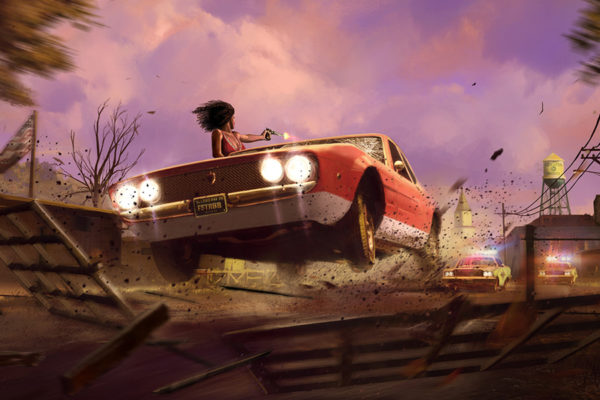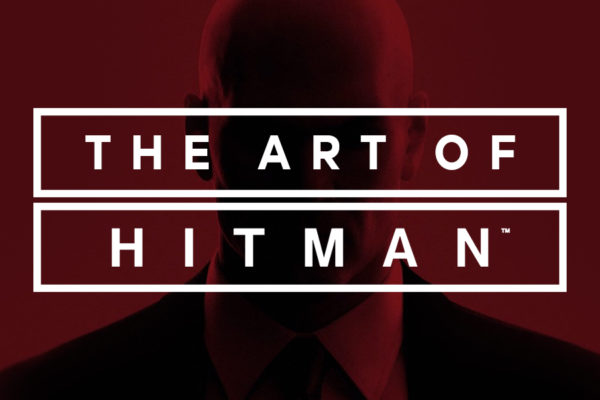
The Art of Mafia 3 with Jonathan Guzi | #178
We’ve got a special article to share with you today, Jonathan Guzi is a Concept Artist currently working at Hangar 13 Games and he has kindly taken the time out to chat to us about the Art of Mafia 3 and also his journey in the industry so far. If you’d like to check out more of Jonathan’s personal creations jump on over to his portfolio by clicking here or click on one of his profile photos below at any time.

Thanks for taking the time out to have a quick chat with us, Jonathan. Can you take a moment to give us a quick background of yourself?

Thanks for having me. I’m a California born, New York raised Concept Artist currently living in the San Francisco Bay area. I studied Illustration in New York City, then freelanced a bit and moved out west right after graduating. About a year later I started working at Hangar 13 on Mafia 3 and have been there for the past two and a half years. I’ve been lucky enough to start working in a large studio relatively early in my career.


When did you seriously start to think about concept art and it

I think I was always aware of wanting to be a concept artist for the entertainment industry, but I sort of lost sight of my goals in college for a while. During my senior

I know personally that the legendary, Emmanuel Shiu was a little bit of a driving force in your early days, were there any other driving forces in you going down the route of becoming a Concept Artist?

To be honest, I still feel like I’m in my early days, and Emmanuel has continued to be a great friend and mentor. As far as any other driving forces, I think just loving video games, movies and pop culture is enough of a driving force for me. Being a part of something larger and working in a creative team is something that you also have to enjoy as an in-house concept artist as well.

I think, the journey that you have had has been quite inspirational, especially with the amount of grinding that you’ve done to get to this point – is there any advice that you can give to people that are say for example, currently in the position you was a few years ago?

It’s difficult to give specific advice whenever I get asked this – circumstances are extremely different for different people. I would say learn how to prioritize and stick to a plan. If you’re going to focus on becoming a better artist for a year, make that your number one priority. Everything else, like going out, having other hobbies, etc. should be secondary. You can figure out a better work life balance after you’ve gotten to where you want to be. It might sound a bit harsh, but I truly believe this.

Hangar 13 at 2K Games is your first gig within the gaming industry (which by the way is a massive undertaking in itself for a first job) but was it an easy step to get into or were there challenges along the way?

There was a brief adjustment period where I worked a little harder for the first couple months (which you should probably do at any job), but I don’t think there was anything that was really massively challenging. The fact that Mafia 3 is more of a realistic game and less design heavy than say, a sci-fi or fantasy game probably helped. Sometimes I had to adapt quickly, but there are freelance assignments that can be just as challenging, if not more.

What is it like being a concept artist within the videogaming industry now that you are in it, versus before you had entered it? How would you describe your experience so far at Hangar 13?

I think I mostly gained an appreciation for how difficult it is to make a game. When you’re freelancing, you’re kind of an outsider and work within your own little bubble. When you’re in-house you get to see all of the challenges and changes along the way. As for my experience at Hangar 13 so far – it’s been fantastic, full of talented industry vets which has been another great way for me to gain insight into the industry.

I try to make it a tradition to ask this question during the interviews here at EscapeTheLevel, so, are you a gamer? What is the standout game for you, from the past lot of years artistically but also as a gamer?

I’ve been a fan of the Witcher series since the first one, but only got to play the Witcher 3 a few months ago since I finally got a better laptop. I’m still very slowly plowing through a bunch of the side quests, but in general I don’t game as much as I used to, unless it’s something I’m really a fan of. It’s also a very pretty game.

What’s the one thing you think is least known about working as a concept artist for games?

I don’t want to make any blanket statements, but I think it’s safe to say that no matter what game you’re working on, you’re probably going to have to delve into a few of your own secondary skills, like graphic design, texture creation, modeling etc.

What’s the first step in the day-to-day operations for you when it comes to creating concept art at Hangar 13?

Coffee first. Then it’s usually just looking through my list of tasks/assignments and planning out when and how to do them. Sometimes, if I’m not in a rush, it could just be an entire day of gathering reference and doing research, which I love. If we’re in the middle of production, most assignments would usually consist of painting over graybox models/layouts and providing a more polished version of something to the environment team or lighting artists.

How did the creative process go while working on Mafia 3? Who did you work with and how much guidance was there?

We’d mostly have reviews with our art director once or twice a week – usually there was a good bit of guidance before any assignment with a round of tweaks after. We’d otherwise have a good deal of flexibility when it comes to how to solve a problem, although since everything had to be period accurate and New Orleans based, it was usually pretty straightforward. Some cases require working closer with other team members, usually the 3d environment artists, in order to brainstorm ideas or flesh out exactly what kind of concepts are needed.

1968, New Bordeaux is heavily inspired by New Orleans, was there a lot of reference work involved? Was there any room to get a bit creative with the theme that you was working on?

Definitely a lot of reference involved, which I think is the foundation of almost all concept work anyway. We were certainly encouraged to take creative liberties when concepting the city because New Bordeaux is a fictional place and we did want to make it feel like our own. Also for design reasons we had to make certain areas of the city much wider and bigger than their real-world counterparts might actually be in order to properly facilitate all the driving and action gameplay mechanics in the game.

Is there anything that you created within the concept art stages that you are quite proud of, something that is now in the game? To counter this, was there anything that you were also proud of but it didn’t make it into the game?

Making games is such a collaborative effort that it’s hard to point to a certain design that you feel is wholly yours. I like how some parts of the French Ward ended up close to the concepts, as well as some of the hideouts. Oddly enough, some of the things that are most satisfying to see in the game are paintings hanging on the walls, which I sometimes had to paint the textures for. As for things that didn’t make it – probably just a prop here or there that got cut.

Did you ever hit a point during development where things got a little too tough? How did you get out of that struggle if so?

There were a few months when everyone had to work extra hours to get the game done in time. I didn’t mind that very much. Sometimes concept artists have to help out with cleaning up textures and things like that if there’s no more concepting to be done, so the challenge is just learning how to do that properly if you’re making changes directly in game. Mostly just being careful and helpful while not making things more difficult for other team members. Like anything else, communication is key.

Mafia 3 is the first game you’ve worked on fully, how does that feel? Working on something for so long to now see said areas or scenes realized in the game?

It’s definitely something I’ll always be proud to have on my resume. I know how rare it is to get that opportunity in this industry and I’m grateful for it. It helps when you actually like the subject matter and story of the game you’re working on as well.

Mafia 3 is one of the rare games that dares to tackle racial issues, especially issues that existed back in 1968, was it interesting to tackle this in early stages of concept art how do you begin to portray that sort of thing in concept art?

It was probably the most unique aspect in the game’s development. It mostly came through in the little details – racist posters, graffiti, and the contrast of poor neighborhoods vs. the rich ones. It led to a lot of questionable google searches when trying to find reference for certain things. I think it was sometimes a bit of a challenge to find the balance between portraying things accurately and going a bit over the top. In the end I feel like we managed to find that balance.


















 designed and developed by
designed and developed by